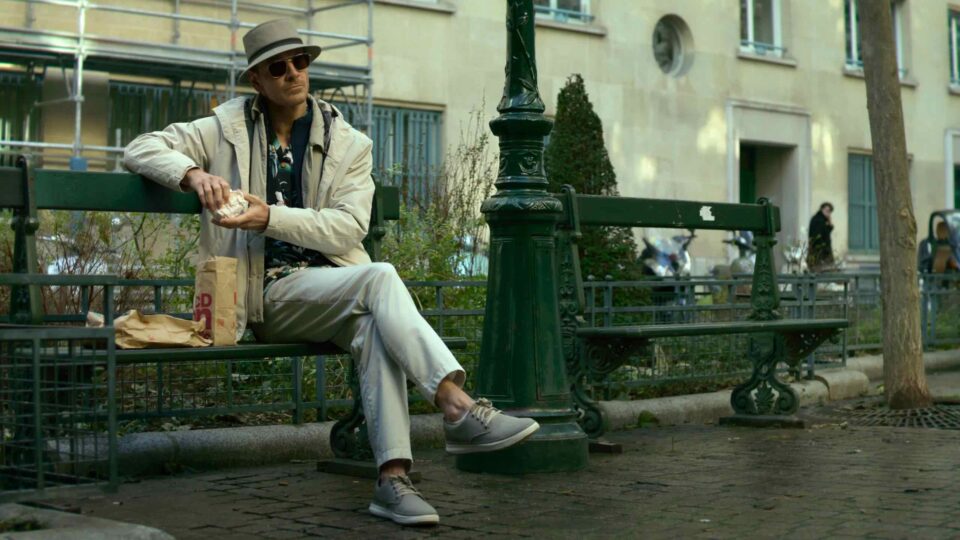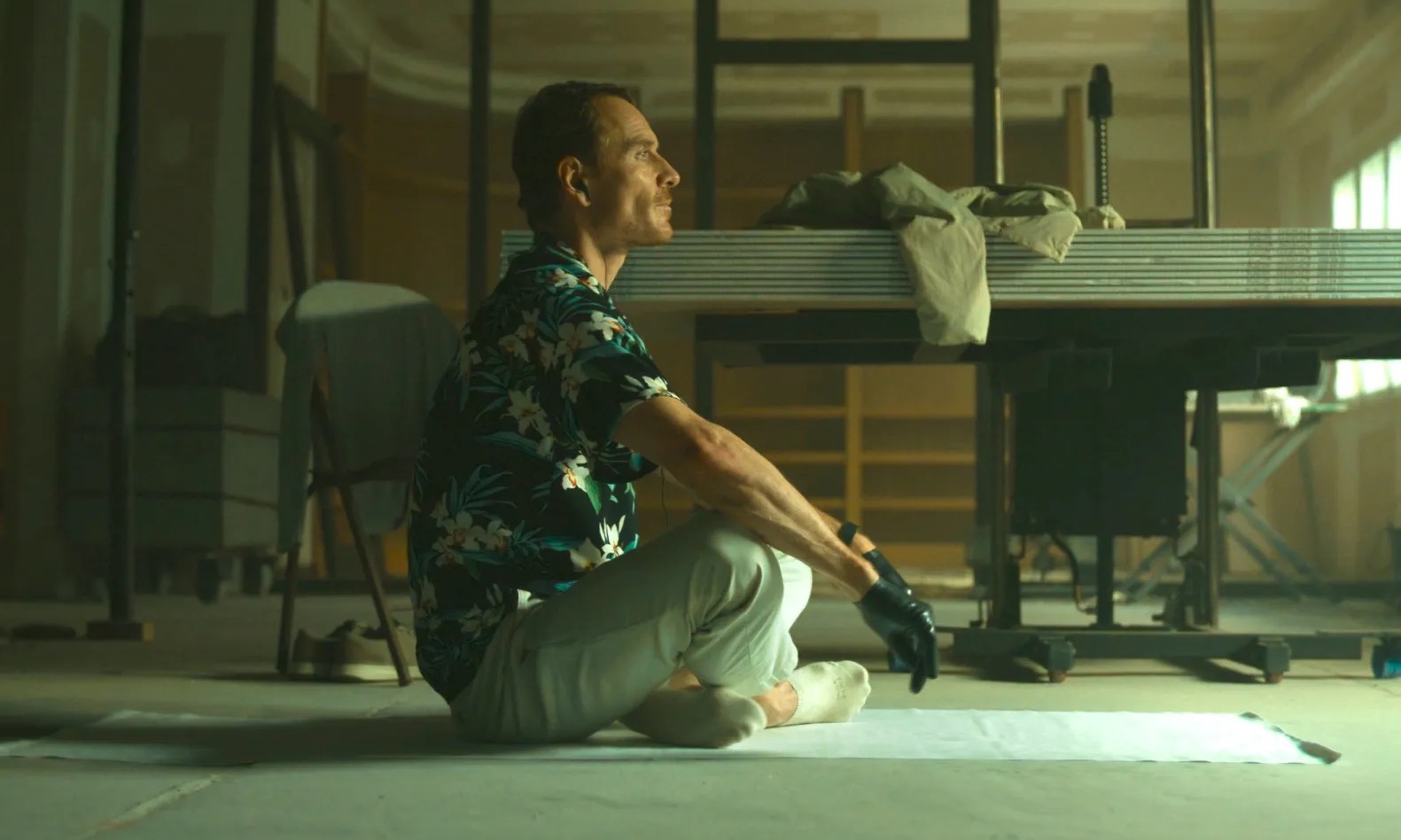“In art as in lovemaking, heartfelt ineptitude has its appeal and so does heartless skill, but what you want is passionate virtuosity.”
— John Barth
David Fincher’s The Killer is a film of superficial sublimity and narrative simplicity, a real letdown from the director of Se7en and Zodiac—or, rather, it is ostensibly these things. The more I thought about it, the more it turned out to be a tricky bastard, the kind of work whose self-awareness and formal facility hark back to the postmodern American penmen of the 1960s like Barth and Coover, a pop-art genre piece with Pale Fire–esque playfulness and murder and the muscle of a Samuel Fuller film, albeit more ostentatious.
It wastes no time flaunting its style, opening with a medley of striking wide-screen shots placed with precision and lit with a lyricism whose beauty hints at melancholy, of Michael Fassbender sitting, stretching, looking out the window through which sun flows in an unsullied stream into the spartan room, always stoical (DP Erik Messerschmidt is simpatico with Fincher’s aesthetic affinities, his preternatural virtuosity with digital filmmaking, having previously worked on Mank and Mindhunter). Fassbender’s hitman is going through the by-now routine process of preparing for his hit as he narrates with such repose it almost feels apathetic. From the rather mundane prattling and Fassbender’s unperturbed movements around the empty room we know that he’s done this a million times, and we sense that he’s grown disillusioned. If Kevin Spacey’s John Doe in Se7en is an eccentric ideologist who views killing at the lord’s work, a killer imbued with purpose, Fassbender is a killer adrift in a pointless slipstream of violence, a man who pulls a trigger without feeling or meaning.
He talks a lot, but never really says anything of specificity or profundity, no poetic turns of phrase, mostly reiterating milquetoast aphorisms (“Empathy is weakness,” he opines more than once, something Fincher’s detractors often say of his films). He narrates unrelentingly, pontificating on this banality and elucidating on that particular detail of his work. His placid intonations initially reminded me of the strained irony and slick, vacuous reveries of Spacey’s character in American Beauty, a film that tries so desperately to be taken seriously it smothers you with its adolescent epiphanies.
Fincher has used voiceovers expertly before, so I was willing to give it time to see what he’s up to. Edward Norton’s musings in Fight Club are inextricable to the film’s success as smart-dumb satire because the self-aware pseudo-seriousness of the philosophical propositions tell us things that we need to know about the characters and the director’s thematic affinities in a way that visual storytelling on its own cannot, making it a harmonious marriage of sight and sound—true cinema. The narration is tinctured with both bro-ish alpha-male humor and a wry, acerbic silliness that mocks its own macho sagacity that American men have been misunderstanding for over 20 years. And in Gone Girl we hear the seemingly honest confessions of a poor, loving, possibly murdered housewife who expounds on the joys and agonies of her life. Then we get the truth—same narrator, different voice. In Alien 3, the eulogy of a funeral by fire plays over cross-cutting to the xenomorph bursting out of an ox carcass, the unsettlingly beautiful collision and cohesion of the poetic and disgusting.
It’s after the film ends and you’re back on the Netflix menu screen that the whole of the picture becomes clear. This is Fincher’s therapy session, a display of formal and narrative genius that masquerades as generic claptrap.
In The Killer, our narrator, a Smiths fanatic, waxes philosophically, but he lacks even the wit of Morrissey. This is by design. He has nothing to say, but he’s an expert craftsman—he has style; hasn’t Fincher been accused of the same? The narration recalls at times something a bored teen might post on Facebook, Jesse Eisenberg sitting sad at the end of The Social Network.
I won’t say much of the plot—which, in one sense, is tepid and doesn’t matter much, and in another is the vital ruminations of a man reconciling with being middle-aged disguised as disposable Netflix entertainment. But one specific moment warrants a few brief words: When Tilda Swinton appears late in the film, we get the required dramatic two-shot scene of philosophical badinage and a metaphorical story told solemnly (Fassbender’s performance here has the same hopeless exhaustion as in The Snowman, albeit here the movie doesn’t suck). It’s television filmmaking. But you just can’t write Fincher and Andrew Kevin Walker—the pair officially reuniting for the first time since Se7en, though Walker doctored the scripts for The Game and Fight Club—off, even though the problems are purportedly obvious; the formal prowess on display from everyone deserves serious attention, but more than just that is how the film fails to impress in any traditional way, and coming from an iconoclast who relishes turning trashy paperbacks into incisive pop-art just makes it all the stranger.

There are parts of the film that are almost hackish (e.g. actually printing the word “Epilogue” on screen as Fassbender summarizes his recent revelations), and Fincher is Hollywood’s great adaptor of stupid source material, certainly no hack. It’s after the film ends and you’re back on the Netflix menu screen that the whole of the picture becomes clear. This is Fincher’s therapy session, a display of formal and narrative genius that masquerades as generic claptrap, punctuated with Fincher’s flashes of pizzazz, but almost always in a manner devoid of his sui generis style, as with a fight that apes Paul Greengrass’ shaky cam of the second and third Bourne movies. How does this assembly of talent do that? Fincher is taking the trashy plot aspect of his career and slitting it belly-open to show us what’s inside. Making a movie this brilliantly while never really showing any kind of soul is an act of introspection. This is technical proficiency as self-examination, self-defense by attack.
Making a movie this brilliantly while never really showing any kind of soul is an act of introspection. This is technical proficiency as self-examination, self-defense by attack.
Fincher has always had a fondness for trashy material, finding in the unsophisticated tales of murder and mystery opportunities to explore his own passions, like broken men looking for renewed purpose in life and badass women proving to be unlikely heroes, the appeal of violence and the consequent rippling effects. Like Claude Chabrol, Fincher uses spare, seemingly simple genre stories and techniques of classic Hollywood filmmaking to ruminate on his own passion for the medium, to scrutinize his singular approach to cinematic storytelling. Fassbender’s stony-faced cipher harks back to Lee Marvin’s terse intensity in Point Blank, and the inner erosion of the amoral man has some thematic and narrative similarities to Killing Them Softly, another elegiac crime film of modest scale shot in stylish widescreen.
As the film unspools, with unusual rhythm and pacing, it almost seems as if Fincher is purposefully underwhelming us, emphasizing the wrong beats, paying inordinate attention to the wrong details, all while Fassbender drones on with his unamazing wisdom. Even the name of the film is bland, and used three decades earlier by John Woo. We get the expected scene of our killer sojourning around a beautiful European city, and a deft fight scene that’s shot with handheld camera (fairly rare for Fincher). And all of it, while so adroitly realized, is perpetually anti-climactic, a sequence of scenes so accomplished in every minute way that you have to be a little impressed that Fincher has made something so familiar, so inexplicably devoid of anything that could possibly be iconic—and, of course, you have to ask yourself why. The Killer questions its own existence, as we all at some point do. FL









